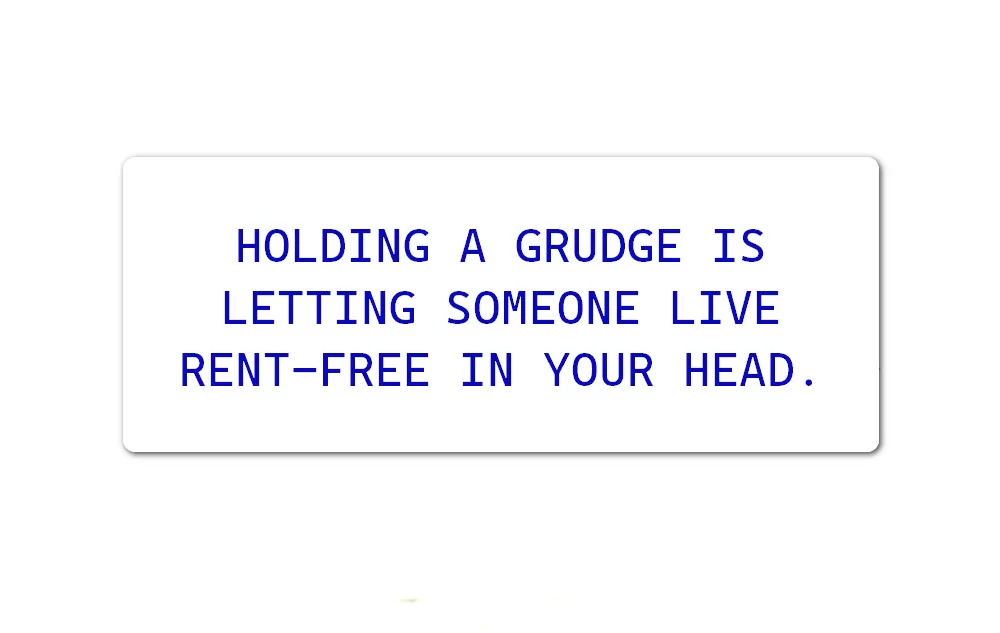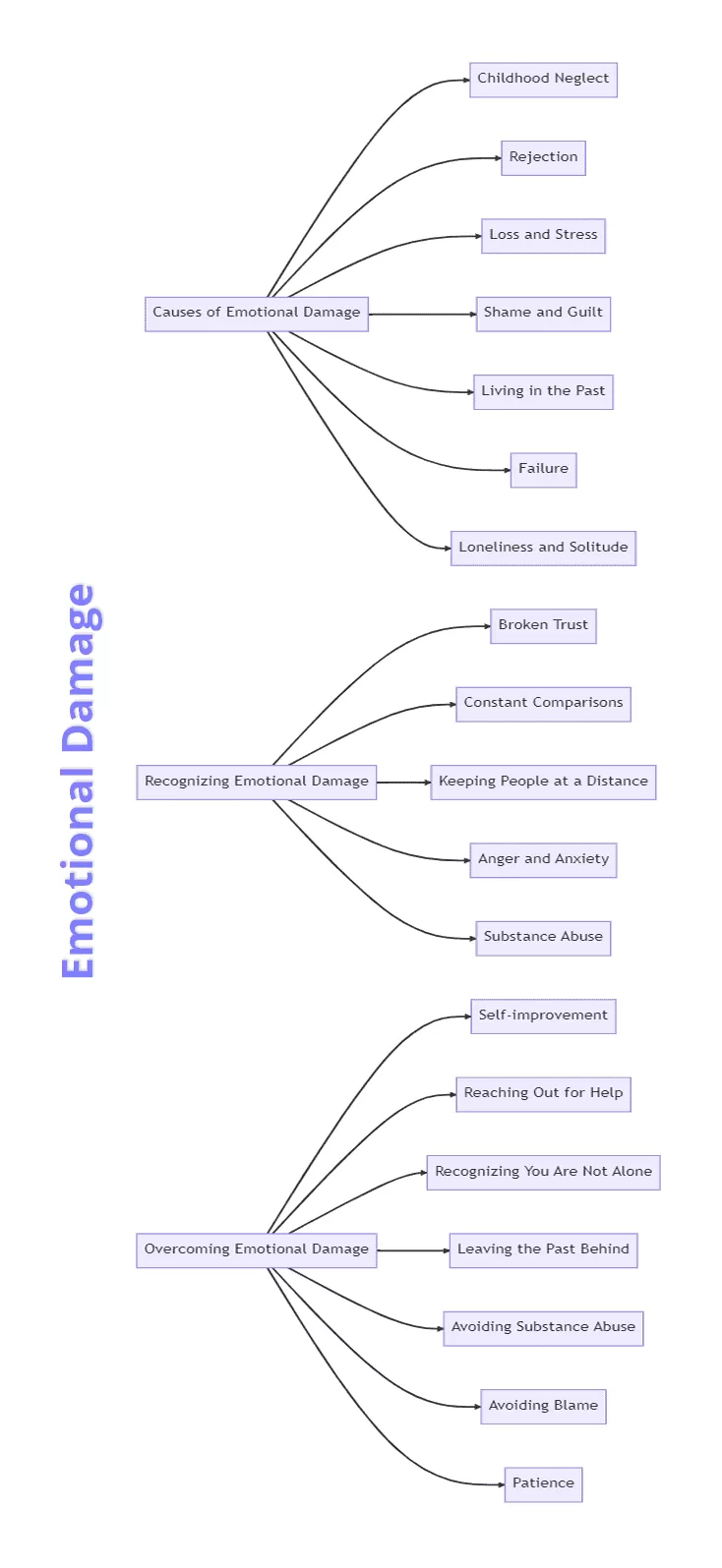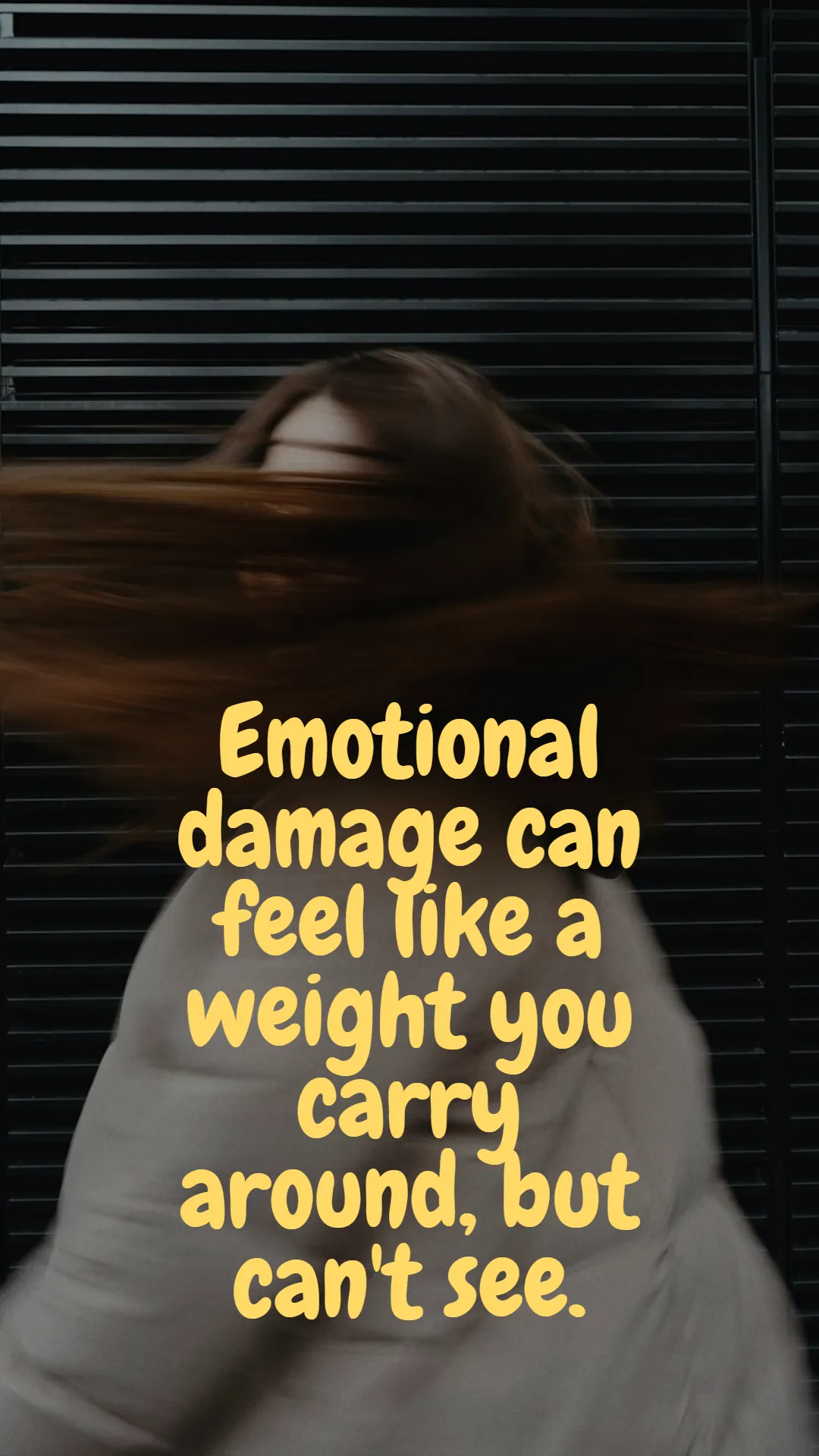Today's Sunday • 11 mins read
For a while, you have felt empty inside and detached from the outside world.
You snap at small irritations, have low moods, and feel flat at joyful things.
Often, you feel “vaguely clear” that something is wrong. You find yourself trying to fill in some half-memories of an old wound, but you can’t.
You might be emotionally damaged.
- Being “emotionally damaged” means you cannot feel, understand, or express your emotions well.
- It could make you feel stressed, lost, with low self-esteem, depressed, and suspicious of others.
- It might be due to some unresolved past trauma that you don’t remember well.
Emotional damage can feel like a weight you carry around, but can’t see.
You see yourself reacting in abnormal, unnecessary ways. It’s damaging more and more areas of your present life, degrading your relationships, and destroying your mental peace.
So, how to recognize its presence, and heal from it?
13 Signs of An Emotionally Damaged Person
Here are the signs that you might be emotionally damaged:
1. Trusting others seems like an uphill battle for you.
Trust is the foundation of any strong relationship, but for you, it’s a fragile thing.
Maybe you’ve been betrayed or hurt deeply in the past, and now you find it hard to let your guard down. Even with close friends or family, there’s a lingering fear of getting hurt again.
This lack of trust creates distance in your relationships, leaving you feeling isolated. Forming new connections becomes even harder when trust issues block you from opening up.
2. You still bear the emotional scars of a past breakup.
The pain of your past breakup is still very real, even if time has passed. You feel stuck in the same spot where they left you.
You might not think about it every day, but now and then, memories bring back the hurt. They don’t let the emotional wounds fully heal.
This emotional baggage casts a shadow over new relationships, leaving you hesitant to get too close.
Fear of repeating the same mistakes or getting hurt again holds you back from fully losing yourself in new love.
3. Small irritations can spark a wildfire of anger within you.
The smallest things set you off, and it feels like your anger is out of proportion.
Whether it’s someone being slightly late, or you overhearing a loose comment from a stranger group, you react with more intensity than you intend.
Beneath that anger lies unresolved emotional pain. It’s not really about the small irritations, but they become the outlet for deeper frustrations.
Anger is often the result of not having responded “correctly” at the time of hurt, or because of carrying a grudge to take revenge at an appropriate time.
This unchecked anger can push people away and leave you feeling guilty afterward.

4. Meeting new people brings a wave of unease and anxiety.
Socializing feels like an uphill battle.
Meeting new people stirs up anxiety, and you find yourself overthinking every interaction.
You’re constantly wondering how you’re being perceived, fearing judgment or rejection. This unease keeps you from fully engaging, leaving you stuck on the sidelines in social situations.
Over time, this can lead to isolation, as the effort of meeting people feels too overwhelming.
5. You’ve endured severe emotional pain for an extended period.
The emotional pain you’ve experienced isn’t something that just fades away.
It stays with you, day in and day out, like a heavy burden. This prolonged suffering can leave you feeling numb or disconnected from others.
You may have gotten used to it, but the weight of it still shapes your interactions and mindset.
Living with deep emotional pain for so long makes it difficult to believe things will ever improve.
6. A sense of gloom and depression frequently overshadows you.
Feelings of sadness or depression seem to be a constant presence in your life.
It feels like a cloud that never really lifts, no matter what you do. You try to distract yourself, but the sense of gloom always returns.
This heaviness makes it hard to find joy or motivation, even in things that used to make you happy. Over time, it can feel like you’re stuck in an emotional rut, unable to see a way out.
7. Your friends express concern about your emotional well-being.
People around you have noticed changes in your behavior or mood.
Friends have commented that you seem distant, stressed, or sad. Their concern might make you feel uncomfortable, but deep down, you know they’re right.
It’s hard to admit when you’re struggling emotionally. Especially when you feel like you should be able to handle it on your own.
You realize that their concern is a sign that your pain is visible, so you try to hide it even harder.
8. You maintain a safe distance from others, physically and emotionally.
Whether intentional or not, you’ve started to create a distance between yourself and others.
This might be physical, like avoiding social gatherings, or emotional, by keeping conversations superficial. You may fear getting hurt again, so you keep your guard up to avoid vulnerability.
This survivalist urge for self-preservation, while understandable, can leave you even more isolated.
Over time, these emotional walls become harder to break down, even with people who care about you.
9. You’re caught in the loop of comparing your own life with those around you.
You find yourself constantly comparing your life to others, and it leaves you feeling inadequate.
Social media only amplifies these feelings, as you see others seemingly thriving while you struggle. This comparison becomes a mental trap, making you feel like you’re falling behind.
The more you focus on what others have, the less satisfied you feel with your own progress. It’s a vicious cycle that deepens feelings of frustration and self-doubt.
10. You often find solace in solitude, preferring your own company over others’.
More and more, you retreat into solitude, finding it easier to be alone than deal with the stress of social interaction.
While alone time can be healthy, you notice it’s becoming a default way of avoiding emotional strain. You prefer your own company because it feels safer, free from judgment or hurt.
As weeks go by, this preference for solitude deepens your sense of solitude. You start to love your isolation so much that it gets uncomfortable to connect with others again.
11. You tend to shut down emotionally when faced with dispute or stress.
When dispute or stress arises, your instinct is to withdraw emotionally. Rather than face the situation head-on, you shut down to protect yourself from further pain.
This emotional shutdown may provide temporary relief, but it often leaves problems unresolved.
This is a coping mechanism, though faulty. It can lead to further emotional disconnect, both with yourself and with those around you.
12. Your past relationships continue to cast a shadow over your new romantic interests.
Even when you meet someone new, past relationships linger in your mind.
You might compare your new partner to old ones. You fear that history will repeat itself.
You cannot bring yourself to fully invest in new relationships, as you’re always looking over your shoulder.
The weight of past hurt keeps you from embracing the potential of a fresh start, leaving you stuck in old patterns of fear and mistrust.

13. You feel like turning to intoxicating substances to numb your emotional pain.
Substance abuse is often a tragic consequence of unhealed emotional trauma. Many people with hurts that haven’t been dealt with or expressed take to alcohol.
Alcohol or drugs may seem like an easy way to cope with deep emotional wounds. They seem to offer an escape from the emotional storm, dull the pain, or calm the anxiety.
But the relief is always short-lived.
Worse, the hurt person may feel the emotions even more severely once they come out of the intoxicating haze. That could then lead to a cycle of dependence.
Substance-fueled altered state of consciousness delays healing.
What Causes Emotional Damage
Emotional damage often stems from painful experiences that leave lasting scars. This complex emotional state can be inflicted by a parent or a romantic partner, or result from personal failures and life events.
- Childhood Neglect. Childhood is the foundation of emotional health. Neglect during this critical time, whether emotional or physical, can result in long-lasting damage.
- Rejection. Repeated rejection in relationships, work, or social settings can significantly harm self-esteem, leading to emotional wounds and a fear of future rejection.
- Loss and Stress. The passing away of a loved one or prolonged stress can trigger emotional damage, causing grief, depression, and a sense of hopelessness.
- Shame and Guilt. Shame or guilt, often from past mistakes or societal pressure, can cause emotional harm by fostering self-blame and feelings of unworthiness.
- Living in the Past. Being stuck in past trauma prevents a person from enjoying the present and looking forward to the future, resulting in emotional damage.
- Personal Failure. Repeated failures can diminish self-confidence, leading to emotional damage and creating a fear of trying again.
- Loneliness and Solitude. Chronic loneliness and isolation lead to emotional damage by causing feelings of alienation, sadness, and depression.

How To Heal Your Emotional Damage
- Self-Improvement. Personal growth is one vital key to healing your emotional damage. Learn new skills, take up enjoyable hobbies, or ask a psychologist to find out what you could do.
- Reaching Out for Help. Talking to a trusted friend or mental healthcare professional can help you work through your hurt and unaddressed emotions.
- Recognizing You Are Not Alone. Realizing that others face similar struggles can bring comfort. It’s important to know it’s okay to ask for help.
- Leaving the Past Behind. Let go of your past hurts. It’s never helpful to keep unhealed wounds open. It will interfere with your recovery process.
- Avoiding Substance Abuse. Turning to alcohol or drugs is the worst way to find relief. They push your hurts under an unconscious haze, which wears off eventually. And then you get dependent on these substances.
- Avoiding Blame. Don’t blame yourself or others for your emotional pain. Focus on healing and looking forward rather than dwelling on blame.
- Patience. Healing is a slow process. Be patient with yourself as emotional recovery takes time, and remember it’s a journey, not a race.
FAQs

How to love someone who is emotionally damaged?
Patience: Understand that healing takes time. Be patient and give them the space they need to process their feelings.
Communication: Maintain open lines of communication. Encourage them to share their feelings and thoughts, but don’t push them if they’re not ready.
Support: Be a strong support system for them. Your support can be a source of comfort and reassurance during their healing process.
Boundaries: Respect their boundaries. If they need space or time, provide it without taking it personally.
Professional Help: Encourage them to seek professional help if they haven’t already. Therapy can be extremely beneficial in dealing with emotional damage.
Consistency: Be consistent in your actions and promises. Consistency builds trust, which can be difficult for someone who is emotionally damaged.
Love: Show them love and kindness even when things are tough. Genuine love can be a powerful healing force.
What to do if someone is emotionally damaged?
Listen: Give them a safe space to express their feelings without judgment. Sometimes, being heard can make a world of difference.
Empathize: Try to understand their perspective and validate their feelings. Avoid minimizing their experiences or telling them to “just get over it”.
Respect their boundaries: They might need more personal space or time alone than others. Try to respect these needs and don’t pressure them into sharing more than they are comfortable with.
Offer support: Let them know you’re there for them. This could be as simple as saying “I’m here for you if you want to talk,” or helping them find professional resources like therapists or support groups.
Be patient: Healing from emotional damage takes time. Be patient with their progress and avoid pushing them to recover faster.
Encourage professional help: If they’re open to it, encourage them to seek help from mental health professionals. Therapists and counselors are trained to help people navigate emotional pain and trauma.
Final Words
To be “emotionally damaged” is like carrying a heavy heart. It’s the lingering pain that follows hurtful experiences, making it hard to trust and connect with others.
It’s a defense mechanism, like building a wall around your heart to keep the pain out. But this wall can also keep joy and love at bay, making life feel less vibrant and full.
But you can be happier in life despite your emotional damage.
√ Also Read: 21 Signs of Emotional Neglect: Unloved But Don’t Know Yet
√ Please share this with someone.
» You deserve happiness! Choosing therapy could be your best decision.
...
• Disclosure: Buying via our links earns us a small commission.
